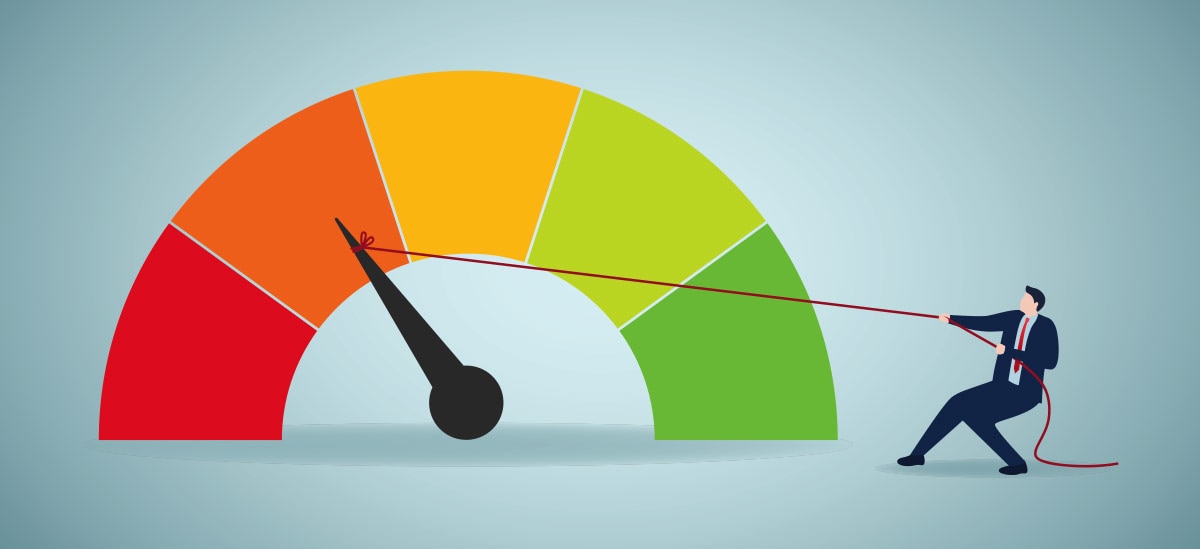
Credit scores are just as essential for businesses as they are for individuals. Many aspects of business credit scores are similar to personal ones (a scale of numbers are involved, and credit reports can help you track your standings), but there are also some key differences. Learning more about those will help ensure you’re keeping an eye on the important factors that can cause it to rise or fall.
What Is a Business Credit Score?
Credit scores help establish a company’s overall creditworthiness in the same way that personal credit scores do for individuals. A good one can help your company gain access to the best financing products from financial institutions with lower interest rates.
Maintaining a healthy business credit score also signals to other companies that you’re reliable to work with, opening the door to more and bigger business with higher limits and better terms.
How to Track Your Business Credit Score
There are several credit bureaus that track business credit scores, but the three main ones are Experian, Equifax and Dun & Bradstreet. Each of these provide business credit reports that track different factors and provide multiple types of credit scores. Unlike personal credit reports, you’ll need to pay to access your business credit reports from most of the major contributors (some offer monthly subscription services for unlimited access, as well). Doing so regularly is the best way to stay on top of this essential financial business information.
- Dun & Bradstreet:[1] This company provides multiple types of credit scores that include both predictive and performance-based information. The D&B Delinquency Predictor Score, for example, predicts whether a business is likely to be severely late with payments or go out of business without paying its debts within the next year. It’s scored on a one to five scale, with lower numbers meaning lower risk for late payment. The D&B PAYDEX is an indicator of trade payment performance based on historical indicators. On this scale of one to 100, scores of 80 and higher are low risk, while 50 to 79 are moderate. Scores lower than that are a considered high risk. To generate a Dun & Bradstreet business credit score, companies need to register for a Dun & Bradstreet D-U-N-S Number.
- Experian:[2] Experian provides a Business Credit Score to predict overall payment behavior on a scale of one to 100, with higher scores meaning lower risk. Their Financial Stability Risk Rating indicates potential risk of “severe financial distress” within the next year. It’s measured on a one to five scale, with a lower score representing lower risk for default. This sample Experian credit report[3] shows what companies can expect to see on their own reports, as well as how different elements are measured.
- Equifax:[4] Like the others, Equifax provides multiple credit scores for businesses. This includes their payment index (a measure of payment history scored from zero to 100, with the higher the score the better), business credit risk score (the probability of businesses becoming severely late on their payments from 101 to 992, with higher scores equaling less risk) and the business failure score (reflecting the probability of a company shutting down in the next year on a scale from 1,000 to 1,880, with lower scores meaning the business is more likely to fail).
Raising Your Business Credit Score: Factors That Have the Most Impact
The bureaus may call their scores by different names, but there are a few factors that they all rely on to get their information and calculate their numbers. Some of this information can be gathered from your public profile, while they might collect other data from banks and/or vendors you’ve worked with, or trade associations that gather these types of facts.
- The age and size of your company
- How long you’ve held your oldest financial account
- The percentage of credit you actually use versus the total credit that’s open to you (your credit utilization)
- Your payment history to both vendors you work with and creditors you borrow from
- The likelihood of failure in your industry
- What trade lines you have already instituted
While some of those factors can’t be helped (like the age and size of your company, for example, or the probability of failure in your industry), others can. Making payments on time, keeping your credit utilization low and remaining loyal to financial institutions can all help raise your score.
Keeping your personal and business credit separate is also extremely important for business owners. Establishing your business as a limited liability corporation (LLC) or corporation helps classify it as an independent entity, separate and not equal to your personal finances. You should also get a separate business credit card and bank account that you use only for business-related purchases and payments. A small business accountant can help you learn more about these intricacies.
Visit PNC’s Small Business hub for additional information on business products and services, or check out our variety of borrowing options, like the small business lines of credit and small business loans.




